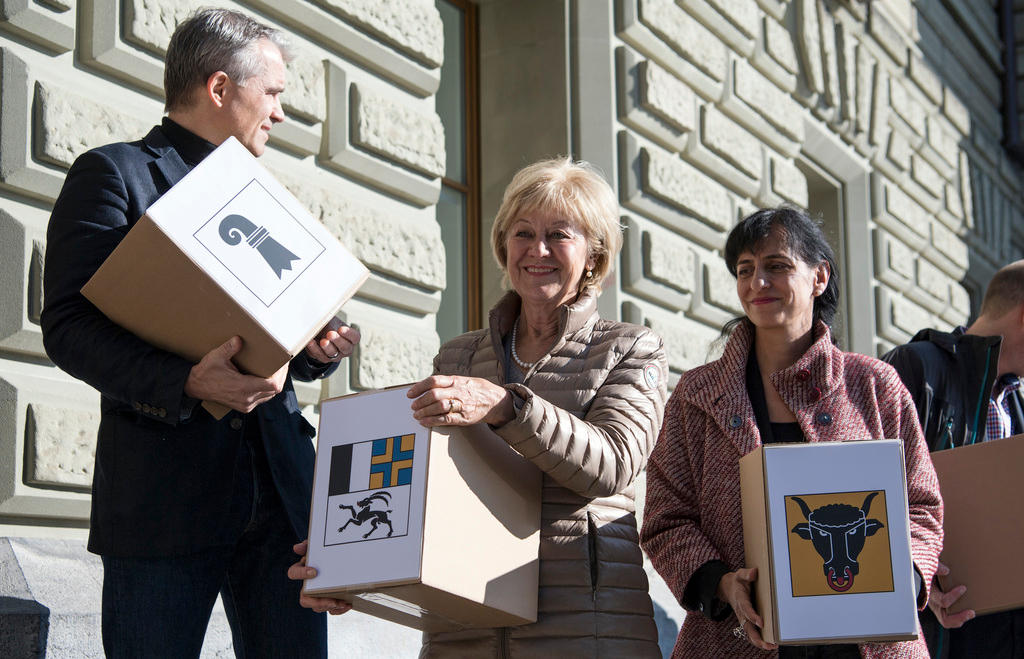
Corporate tax reform to be decided at ballot box

Voters will have the final say on a major reform package aimed at abolishing controversial tax privileges for international companies, introducing a number of compensation measures.
Leftwing campaigners, led by the Social Democratic Party, say the reform is at the expense of ordinary citizens.
“It is a giant cheat,” said Social Democratic parliamentarian Beat Jans as 56,000 signatures were handed in to the Federal Chancellery in Bern on Thursday.
“The reform will lead to a drop in revenue, pension cuts and higher levies.”
The opponents say international firms and shareholders are the main beneficiaries of the corporate tax reform approved by parliament in June.
The necessary signatures were collected over the past 100 days, challenging the decision to a nationwide vote.
The referendum is likely to take place next February. A date still has to be set by the government.
Complex reform
About 24,000 foreign companies currently enjoy privileged tax status in Switzerland, mostly domiciled in the French-speaking cantons of Geneva, Vaud and Valais.
Other cantonal hot spots for overseas firms are the cantons of Zug, Schwyz and Obwalden.
The highly complex reform will not only affect the federal finances but also have major implications on the country’s federalist fiscal structure of compensation payments, as well as on the cantonal and local authorities – which enjoy a far-reaching tax autonomy.
Opponents of the reform set the shortfall of revenue at CHF1.3 billion ($1.33 billion) annually for the federal tax administration and warn of even higher tax losses at municipal and cantonal levels.
Plans to challenge a law giving homosexual couples to adopt stepchildren have failed.
The deadline for campaigners to force a referendum ran out on Thursday. Those campaigning were a cross-party group led by the fundamentalist Federal Democratic Union.
Parliament approved the law last June.
Vania Alleva, president of the leading Unia trade union, said the local authorities would have no choice but to raise taxes for citizens and increase fees for public services such as child care institutions, tickets for public swimming pools, and waste disposal.
Competitive edge
Supporters of the corporate tax reform, including a majority in parliament as well as the business umbrella organisation, economiesuisse, have accused the political left of jeopardising Switzerland’s competitive edge and putting 150,000 jobs at risk.
They welcome the new rules.
“The new system creates a level playing field for all companies. The reform will provide an attractive and internationally recognised tax system for Switzerland,” a statement said.
The tax reform was driven by the Organisation for Economic Co-operation and Development (OECD) and the European Union over the past ten years. They ruled the granting of cantonal tax relief on the overseas earnings of Swiss domiciled foreign companies as anti-competitive and a distortion of free trade.
The Swiss government has repeatedly said it was important to act now to give investors the necessary legal security and prevent international companies from leaving Switzerland.
If implemented, the new regime will scrap the special tax status of foreign holding, mixed and auxiliary companies. In an effort to retain Switzerland’s attractiveness as a destination for overseas corporate headquarters, a number of other tax measures will be introduced.
These include a lower cantonal levy of up to ten years on the hidden reserves of foreign companies domiciled in Switzerland, tax breaks for research and development (the so-called licence box) and a reduction in the general rate of cantonal corporate tax for all firms – domestic and foreign.

In compliance with the JTI standards
More: SWI swissinfo.ch certified by the Journalism Trust Initiative


























You can find an overview of ongoing debates with our journalists here . Please join us!
If you want to start a conversation about a topic raised in this article or want to report factual errors, email us at english@swissinfo.ch.